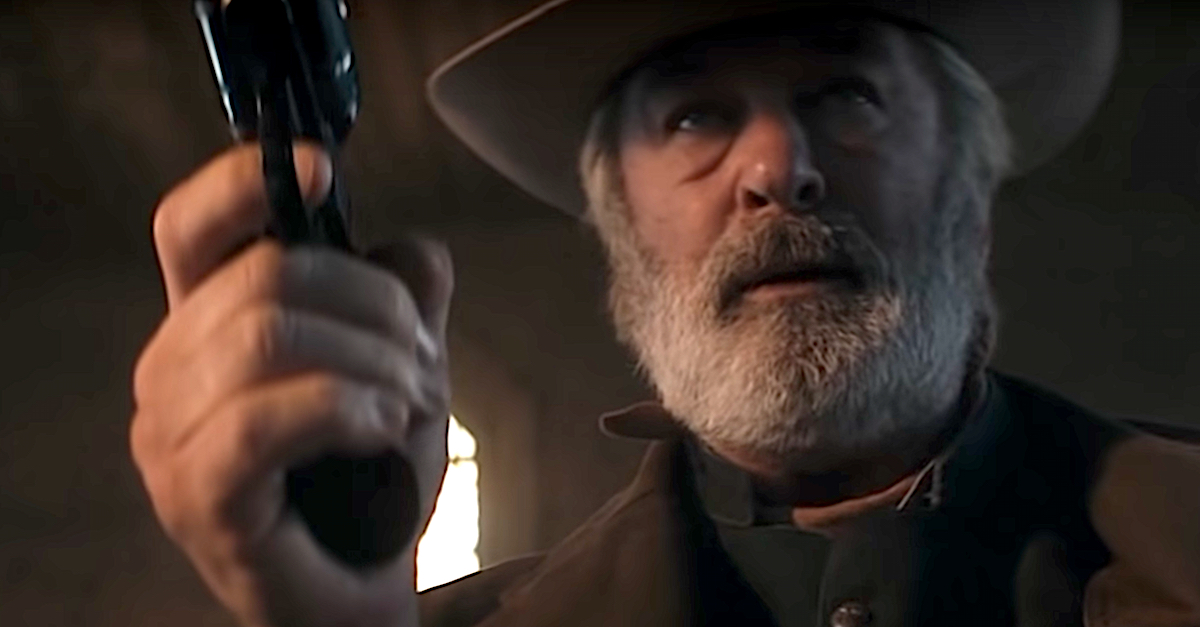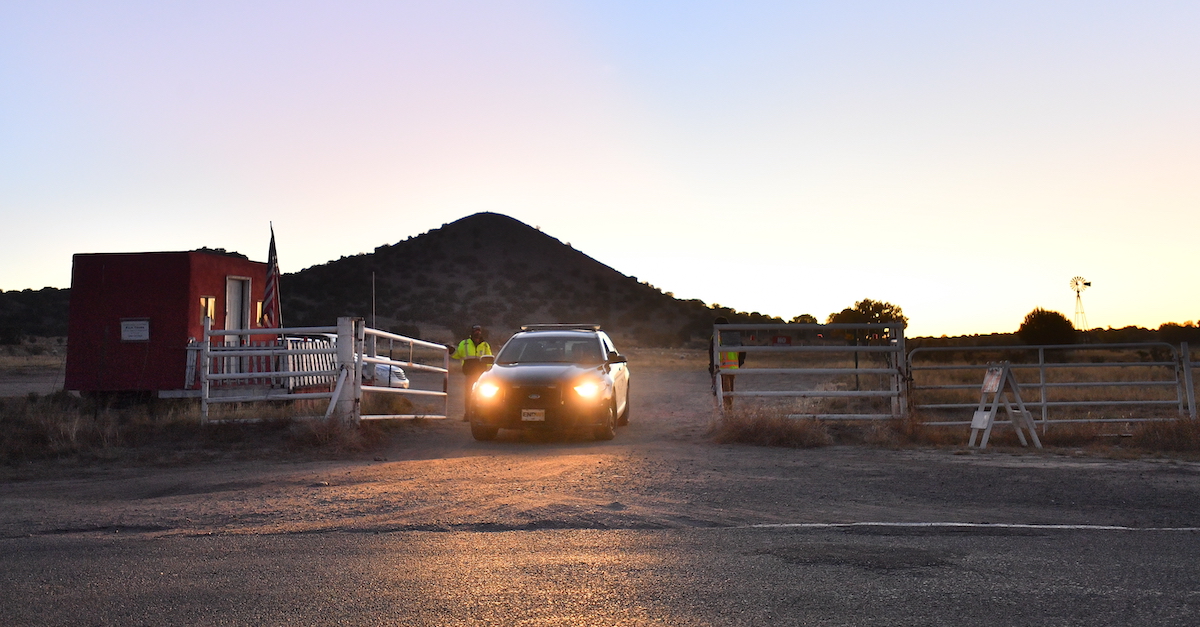
Alec Baldwin was photographed at the Hamptons International Film Festival on October 9, 2022 in East Hampton, New York. Mamie Mitchell spoke during a press conference to announce her lawsuit against Baldwin on November 17, 2021 in Los Angeles.
A California judge on Tuesday determined that a script supervisor attached to the Western film Rust can move forward with many — but not all — of the claims she alleged in a civil lawsuit against actor Alec Baldwin.
Mamie Mitchell sued Baldwin and his finance company El Dorado Pictures, Inc., for injuries she allegedly sustained when Baldwin “discharged a loaded gun towards” her, the judge’s opinion indicates. Celebrity attorney Gloria Allred is representing Mitchell.
Mitchell was not hit by the bullet. However, she initially alleged three causes of action: (1) assault; (2) intentional infliction of emotional distress (IIED); and (3) deliberate infliction of harm. Those claims were subsequently amended to include (1) assault and battery, (2) IIED, and (3) negligence, Tuesday’s opinion indicates.
Los Angeles County Superior Court Judge Michael E. Whitaker determined on Tuesday that the assault and the IIED claims could continue against Baldwin, but not against El Dorado Pictures. The negligence count could continue against both Baldwin and El Dorado, the judge determined. He also determined that Michell properly alleged enough “vile, base, contemptible, miserable, wretched or loathsome conduct” to seek punitive damages.
Baldwin and El Dorado had moved to demur — or, in other words, dismiss — all three of the alleged counts starting as far back as January 2022. Baldwin and El Dorado also moved to strike Mitchell’s request for punitive damages.
California uses the old-fashioned term “demurrer” to describe what is similar to a Rule 12(b)(6) motion in federal courts, but the function is to dismiss the case on the complaints alone because they fail to allege a sufficient cause of action upon which relief may be granted. This type of early-stage dismissal, however, requires judges to assume that all of the facts alleged by the plaintiff are true. The standard tests whether those facts allege a claim the law recognizes as valid.
“[T]he reviewing court draws inferences favorable to the plaintiff, not the defendant,” the judge noted — citing relevant case law.
And, here, that meant Mitchell could ultimately move forward — but not without losing a few rounds in the process.
Judge Whitaker’s opinion walked through several technical matters involving page limits and the like before cutting closer to the merits.
Deadlines and Page Limits
First, Mitchell filed an opposition motion that was “untimely by one day,” the judge wrote. “Nevertheless,” because the “[d]emurring [d]efendants filed a reply on the merits,” the judge excused that error.
Second, Mitchell filed a series of documents “in violation of the page limit requirements.” The judge sustained an objection as to those papers by the defendants.
Therefore, the judge only considered part of the documents in question, and the upshot was here was slightly more momentous: the judge denied Mitchell’s request for judicial notice — that is, for the judge to assume as true a fact related to the matter — over “whether a gunshot blast’s shockwaves can lead to neurological injuries.”
The judge said that question “goes outside the four corners of the second amended complaint” and didn’t give the matter more attention than that.
Uncertainty
Next, the judge then said that Baldwin and his company primarily sought to dismiss the case on the legal concept of “uncertainty” — a “highly disfavored” option because “ambiguities can be clarified under modern discovery procedures.”
“Accordingly, the Court overrules the demurrer on the grounds of uncertainty,” the judge wrote — meaning Baldwin failed to stop the case using that particular mechanism.
After dealing with those matters, the actual causes of action were analyzed to ascertain whether or not the facts alleged were plausibly connected thereto.

Alec Baldwin appears in a rehearsal recording from the Western film “Rust.” (Image via YouTube screengrab.)
Assault and Battery
The judge noted that Mitchell agreed to dismiss her battery claim (likely because no physical contact occurred) and honored that request. But the assault claim could remain active, the judge rationed, as to Baldwin — but not to El Dorado Pictures.
Though the civil suit is proceeding in California, the judge cited underlying New Mexico assault laws and latched on to following alleged facts — along with a few others, in full-page-block-quote fashion — from Mitchell’s complaint:
Every safety protocol designed to ensure that firearms would be safely used were ignored, and actions that were taken were against all industry norms, including, without limitation, as follows:
Alec Baldwin intentionally, without just cause or excuse, cocked and fired the loaded gun even though the upcoming scene to be filmed did not call for the cocking and firing of a firearm.
Alec Baldwin intentionally, without just cause or excuse, fired the gun towards individuals, including Plaintiff, Ms. Hutchins, and Mr. Souza, even though protocol was not to do so.
The lengthy copy-and-paste from Mitchell’s complaint was sufficient, the judge determined while repeating it verbatim.
“For pleading purposes, the Court finds the [second amended complaint] alleges facts sufficient to establish Baldwin endangered the safety of others by handling or using the subject firearm in a negligent manner, constituting negligent use of a deadly weapon under New Mexico Statutes Annotated section 30-7-4,” the judge wrote.
Therefore, the facts were enough to allege a colorable assault claim at this stage of the proceeding.
A similar yet shorter analysis then played out for Mitchell’s claims involving negligent use of the firearm. Those claims were tied into the first count which alleged an assault.
“Accordingly, the Court finds the SAC alleges facts sufficient to constitute a cause of action for assault against Baldwin,” the judge wrote in conclusion.
The conclusion was similar to that reached against various other defendants on Sept. 16, 2022, the judge noted; he referenced that prior ruling by incorporation.

In a screengrab from a police interview video, Alec Baldwin reacts to news that “Rust” cinematographer Halyna Hutchins was dead.
Intentional Infliction of Emotional Distress (IIED)
Here, again, the judge rubbished the IIED claim against El Dorado — but not against Baldwin — using particularly damning language:
For pleading purposes, the Court finds Plaintiff’s allegations, taken together, establish extreme and outrageous conduct on the part of Baldwin in reckless disregard of Plaintiff that caused Plaintiff extreme and severe emotional distress. Namely, Baldwin recklessly engaged in extreme and outrageous conduct when, despite being aware requisite firearm safety precautions had been ignored and live ammunition was present on the film set, he unexpectedly cocked and fired a loaded handgun in Plaintiff’s direction without first confirming it did not contain live ammunition. Accordingly, the Court finds the SAC alleges facts sufficient to constitute a cause of action for IIED against Baldwin.
Again, at this stage of the litigation, the judge has to assume the facts Mitchell has presented are true. Given that legally forced assumption, the judge found that Mitchell had pleaded a colorable IIED claim.

Halyna Hutchins appears in a photo released by her family’s attorneys. Hutchins was killed, and director Joel Souza was injured, on the set of ‘Rust.’
Negligence
The judge determined that Mitchell alleged proper negligence claims against both Baldwin and El Dorado Pictures.
“Under New Mexico Law, Plaintiff must allege ‘a duty owed from the defendant to the plaintiff; that based on a standard of reasonable care under the circumstances, the defendant breached that duty; and that the breach was a cause in fact and proximate cause of the plaintiff’s damages,'” the judge wrote — again citing case law.
The judge then cited nearly two full pages of direct quotations from Michell’s second amended complaint and determined that the quoted facts were sufficient to allege a negligence claim.
“Simply because the film production was for a western film using firearms does not mean that Demurring Defendants had no responsibility for acting with due care handling a firearm during the filming,” the judge wrote. “Whether Demurring Defendants acted reasonably under the specific circumstances, including allegations of violations of industry-wide safety protocols for handling of guns on film sets [citation omitted], is ultimately a question not appropriate at the demurrer stage.”
“It is true that Plaintiff must plead how her injuries are a foreseeable result of the alleged negligence,” the judge continued. “And Plaintiff has done so here. It is foreseeable that an actor who negligently violates firearm handling protocols may fire a loaded gun in a manner that can cause physical or emotional injuries to participants on set. The Court can liberally construe the pleadings here to show the existence of a duty and a breach of that duty.”

A Santa Fe County Sheriff’s Office car leaves through the entrance to the Bonanza Creek Ranch on October 22, 2021 in Santa Fe, New Mexico, where ‘Rust’ was being filmed. (Photo by Sam Wasson/Getty Images.)
Punitive Damages
Judge Whitaker determined that Mitchell argued a colorable case for punitive damages.
“Here, Demurring Defendants argue that Plaintiff’s allegations do not show intentional conduct and fail to rise to the level of ‘vile, base, contemptible, miserable, wretched or loathsome conduct’ necessary for punitive damages,” the judge wrote. “The Court disagrees.”
“For pleading purposes, the Court finds the second amended complaint alleges facts sufficient to establish despicable conduct carried out by Demurring Defendants with a willful and conscious disregard of the rights or safety of others,” the judge continued.
Specifically, the judge latched on to Mitchell’s arguments about “prior safety issues that placed Demurring Defendants on notice of serious firearms-safety-related problems on the set that endangered the cast and crew.” Mitchell further alleged that the defendants “ignored” those problems and “decid[ed] not to search for and/or remove any live ammunition from weapons being used on the set,” the judge noted.
Leave to Amend
Finally, the judge said Mitchell could not amend her filings in a way that might allege colorable claims against El Dorado as to counts one and two.
“Plaintiff has failed to meet her burden to show how she can amend her pleadings to maintain the first and second causes of action against El Dorado,” the judge wrote. “Her opposition does not brief this issue, and instead merely requests leave to amend without any reasoned analysis.”

A KOAT-TV screengrab shows police activity at the Bonanza Creek Ranch near Santa Fe, N.M., after a deadly shooting on the set of the film “Rust” on Oct. 21, 2021.
The Background
Mitchell said in her original lawsuit that the fatal on-set shooting left her with severe physical and mental injuries.
“Alec Baldwin intentionally, without just cause or excuse, cocked and fired the loaded gun even though the upcoming scene to be filmed did not call for the cocking and firing of a firearm,” the original November 2021 lawsuit alleged. “Alec Baldwin intentionally, without just cause or excuse, fired the gun towards individuals, including Plaintiff, Ms. Hutchins, and Mr. Souza, even though protocol was not to do so.”
“As a result of defendant Baldwin’s pointing and discharging the gun towards her, [Mitchell] has suffered compensable damages including, without limitation, extreme and severe emotional distress for which she has had to employ medical treaters, including, without limitation, mental health providers for her emotional and/or physical injuries,” the lawsuit continued. “Plaintiff was severely injured in, without limitation, her health, strength and activity and sustained serious physical trauma and shock and injury to her nervous system and person, all of which injuries have caused, and continue to cause Plaintiff extreme mental, physical and nervous pain.”
The case is number 21STCV42301 in the Whittier Courthouse. The full opinion and order is available here.
[Featured photos of Baldwin by Sean Zanni/Getty Images for the Hamptons International Film Festival; photo of Mitchell via Rodin Eckenroth/Getty Images.]